Chautauqua 2023
After three summers away from Chautauqua, we loved visiting Peg and Jack again on their welcoming porch. We loved looking at Peg’s bright new garden and recalling the fun times we had there from 2012 – 19. It was a joy to hear the Tower Bells three times each day, discuss lectures and issues, and attend nightly concerts of live music.
Hallelujah for Music at Chautauqua
- On Monday night the Music School Festival Orchestra, conducted by Timothy Muffitt, opened with Shostakovich’s Violin Concerto No. 1 in A minor, Op. 77. The soloist had won a competition last year to play this work and she was really terrific. Next they played Dvorak’s Carnival Overture and finally, Paul Hindemith’s Symphonic Metamorphosis on Themes by Carl Maria von Weber. These works were unfamiliar to me, but I admired how well the student musicians played.
- Tuesday, Peg and I attended a pre-concert lecture by David Levy, and learned what to listen for when the Chautauqua Symphony Orchestra, under the direction of Rossen Milanov, played Sibelius’ Valse Triste and Rimsky-Korsakov’s Scheherazade. Jack and Steve met us at the concert.
- Wednesday was a stellar performance by the Rodney Marsalis Philadelphia Big Brass Band. Jack and Steve had both played the euphonium and they really grooved on this band’s varied program. In Sousa’s Stars and Stripes Forever, it was the huge tuba that played the part of the tiny piccolo I used to play in high school!
-
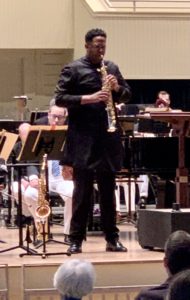
Steven Banks Thursday we went to another pre-concert lecture by David Levy (with whom Steve had played golf that morning) and another concert by the Chautauqua Symphony Orchestra directed by Rossen Milanov. This one was the best of all. Steven Banks played Billy Childs‘ brand-new Concerto for Saxophone and Orchestra, which Chautauqua had co-commissioned. Wow! At the final note, the crowd rose unanimously for a standing ovation. Then the audience hushed as Banks played The Lord’s Prayer as an encore on the soprano sax, without accompaniment. Many cried. This was only the second performance of Childs’ new work. Click here for a review of its premiere in Kansas City last February. Several more performances are scheduled. The saxophone, invented by the Belgian instrument maker Adolphe Sax in the early 1840s, is important to me. I accompanied many saxophone soloists who studied with Ada Creel, an excellent teacher in my high school.
Here’s more about the Concerto from the Kansas City Classsical Music station:
“The arc of the piece follows “the trajectory of the Black experience from actually being in Africa before slave trade all the way to now, and going forward in a hopeful way,” Banks says. Banks is a musician on the rise, a sought-after soloist and collaborator. He’s the winner of the 2022 Avery Fisher Career Grant and in 2019 was the first saxophonist to win first prize at the Young Concert Artists Susan Wadsworth International Auditions.
Banks reached out to Childs about creating a concerto for saxophone. An award-winning composer and performer, Childs has been described as “the most distinctly American composer since Aaron Copland,” drawing from classical idioms, minimalism, jazz, and avant garde techniques. For the concerto, Childs takes inspiration from poets Nayyirah Waheed, Claude McKay, and Maya Angelou. Click here for more about Banks and Childs. They join my list of gifted musicians of the African Diaspora, like Florence Price and Nathaniel Dett, whom I got to know during my Covid isolation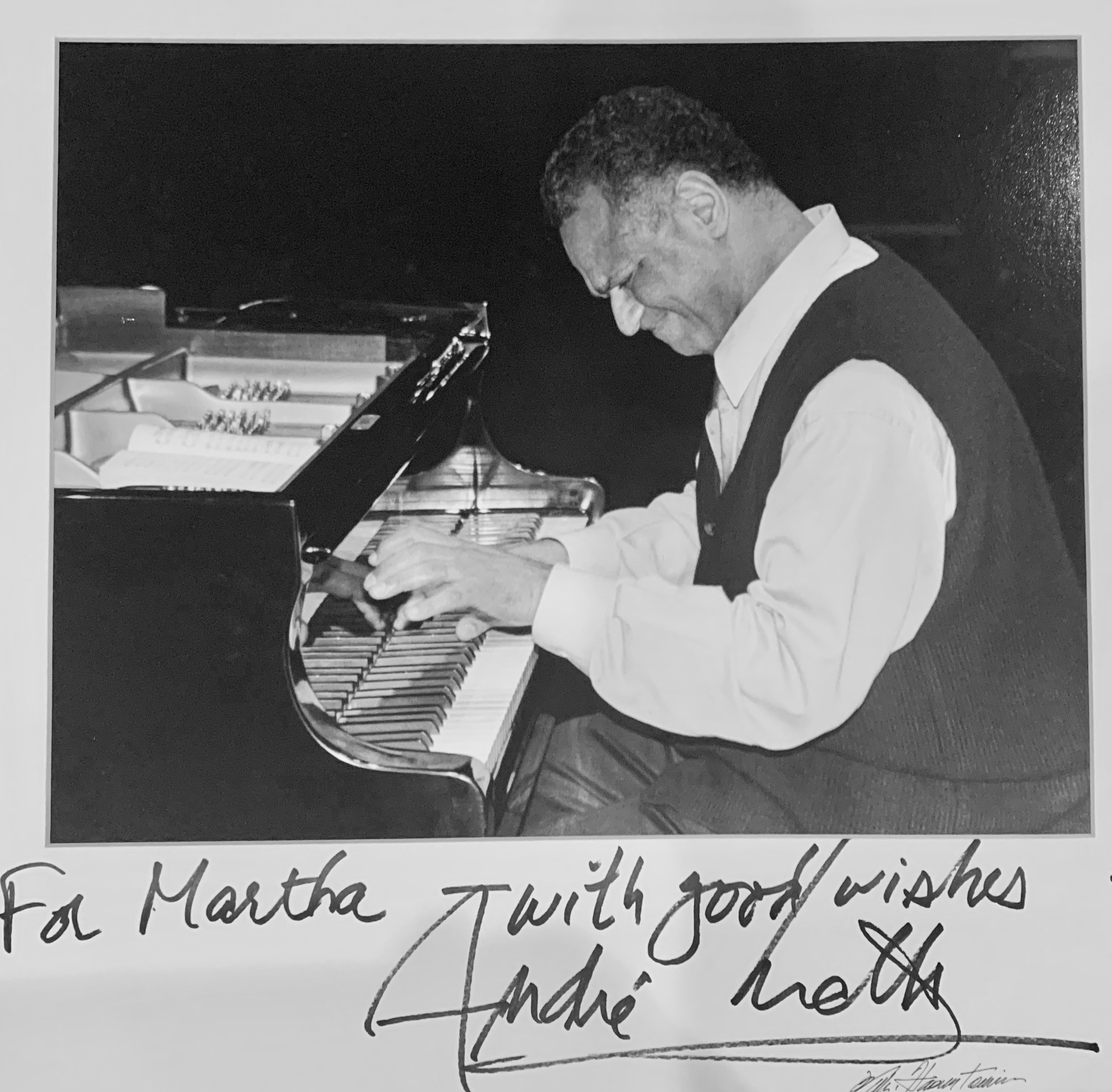 Steven Banks dedicated his performance of the Concerto to the memory of pianist André Watts, who had died the day before, on July 12. I had met Watts and heard him play several times. I even got him to autograph a photo taken by my friend William Haroutounian. Watts was on the faculty of the Jacobs School of Music at Indiana University, where Banks got his Bachelor in Music.
Steven Banks dedicated his performance of the Concerto to the memory of pianist André Watts, who had died the day before, on July 12. I had met Watts and heard him play several times. I even got him to autograph a photo taken by my friend William Haroutounian. Watts was on the faculty of the Jacobs School of Music at Indiana University, where Banks got his Bachelor in Music.
Leonard Cohen’s Hallelujah!
In addition to listening to concerts, I took Phil Lerman’s 3-day course on Hallelujah and other songs by Leonard Cohen. Not until Cohen died in 2016 did I begin to focus on his music, so I had a lot to learn. Cohen was born in Montreal in 1934 and is buried there in a Jewish cemetery. At 15, he discovered the poems of Garcia Lorca and began to study Spanish flamenco guitar progressions. He started writing books of poems and published a novel, Beautiful Strangers, in 1968. He recorded Suzanne in 1966, met fellow-Canadian Joni Mitchell in 1967, and met Judy Collins in New York City. In the 1970s he was married to Suzanne Ellerod. His son Adam was born in 1972 and his daughter, Lorca, in 1974–close in age to Lilli and David.
Lerman played excerpts of many of Cohen’s songs and discussed their Biblical and contemporary references. The first verse of Hallelujah presents David, the Psalmist/musician, and the harmonic progression–tonic, subdominant, dominant, and relative minor:
Now I’ve heard there was a secret chordThat David played, and it pleased the LordBut you dont really care for music, do you?It goes like this, the fourth, the fifthThe minor falls, the major liftsThe baffled king composing Hallelujah
The next verse relates the tale of King David and Bathsheba, a sordid tale that still ends with the underlying hope of “Hallelujah.” I especially liked the 4th verse, which might have been Hilary Clinton’s concession speech, and I volunteered to sing it on the last day when all 50 of us stood and sang together.
Now I’ve done my best, I know it wasn’t muchI couldn’t feel, so I tried to touchI’ve told the truth, I didnt come to fool youAnd even though it all went wrongI’ll stand before the Lord of songWith nothing on my tongue but Hallelujah.
Hallelujah, HallelujahHallelujah, Hallelujah
This course filled in a big gap in my musical education; Hallelujah keeps going through my head and now I can play it on the piano.
Chautauqua Continuing Friendships
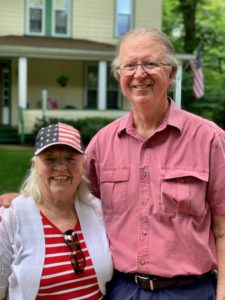 Between the Hallelujah class and the morning lecture, I could stop by the Methodist House across from the amphitheater and chat with Jan and Michael Yauch, old friends from both Arlington and Chautauqua. They were busy running this wonderful welcoming place, so here’s a photo of them from a few yeas ago.
Between the Hallelujah class and the morning lecture, I could stop by the Methodist House across from the amphitheater and chat with Jan and Michael Yauch, old friends from both Arlington and Chautauqua. They were busy running this wonderful welcoming place, so here’s a photo of them from a few yeas ago.
Shelby, Sean and Nancy Eidson had alerted me that Daniel Kanter, leader of the Unitarian Universalist Church in Dallas TX, would be at Chautauqua during Week Three. I caught the end of a talk he gave at the UU House and conveyed greetings from all the Eidsons. We all loved hearing his sermons when Shelby and Sean lived in Dallas.
Can the Center Hold? A Question for Our Moment
The theme for morning lectures at Chautauqua during Week Three featured speakers addressing the current stark divisions in our society. Here are the speakers I heard:
- William Kristol described the United States as a deeply Polarized nation. I tried hard to listen, but his frequent platitudes and his monotone voice made it hard. From my friend Nick Hagoort, I learned that Kristol’s father was Irving Kristol, who lived in Falls Church VA and was known as “the godfather of neoconservatism.” I’ll have to read more about them to understand that viewpoint. I know “neocon” is accepted in Spelling Bee.
- Angela Garbes interested me more than she did Steve. Of Filipino heritage, she discussed the essential role of mothering and reflected on the state of caregiving in America. She believes that caregiving and parenting should be recognized as the work that makes all work possible. I agree. Perhaps more appreciation for all types of caring just might help heal our divisions. I was glad to see that her two young daughters were in the audience with her husband.
- Norman Ornstein agreed with Kristol that our country is deeply divided, but asserted that Tribalism is a better term and attributed its rise to Newt Gingrich and the Tea Party in the mid-90s. “We don’t agree on what issues are important, and we don’t agree at all on what the solutions are,” he said. “At America’s founding, the Federalists and Anti-Federalists disagreed over what power national government should hold. Frankly, in many ways, the Anti-Federalists and the Southerners and the Confederacy … are now winning,” Ornstein said. “We are seeing the development of separate states moving in very different directions, and the whole concept, which is essential to our society of equal protection under the law, is dissipating.” When the nation’s framers decided the country would have a congress, instead of a parliament, it was because the word’s origin in Latin means “come together.”
- Walter Russell Mead asserted that the Information Revolution we are now in the midst of is as important as the Agrarian Revolution of prehistoric times and the American Industrial Revolution (1870 – 1945), and he predicted that the Information Revolution is going to get even more disruptive before it gets better. But he sees American society as having unlimited potential. “The U.S. is extraordinarily adaptable. We have found ways of re-inventing ourselves. We have adapted to change while keeping our values.”
- Emily Esfahani Smith, the youngest speaker, contrasted the Pursuit of Happiness (see my post on Happiness nine years ago) with a Meaningful Life (connecting and contributing something beyond yourself). Like Leonard Cohen, she grew up in Montreal, where her parents administered a Sufi meeting house dedicated to meditation and community service. She described Four Pillars of Meaning: Belonging (family, town, church, groups), Purpose (values that drive one into the future), Transcendence (self-loss and connectedness with nature, music, art and the sacred), and Narratives (the story of how you became the person you are today). That seems to describe my life at this point and gives me fresh encouragement for writing this blog.
Transcendent Art
I left Smith’s lecture and returned to the Art Gallery where I had seen this stunning mylar wall installation by Kazue Taguchi, titled Llum d’onada (Spanish for light wave)..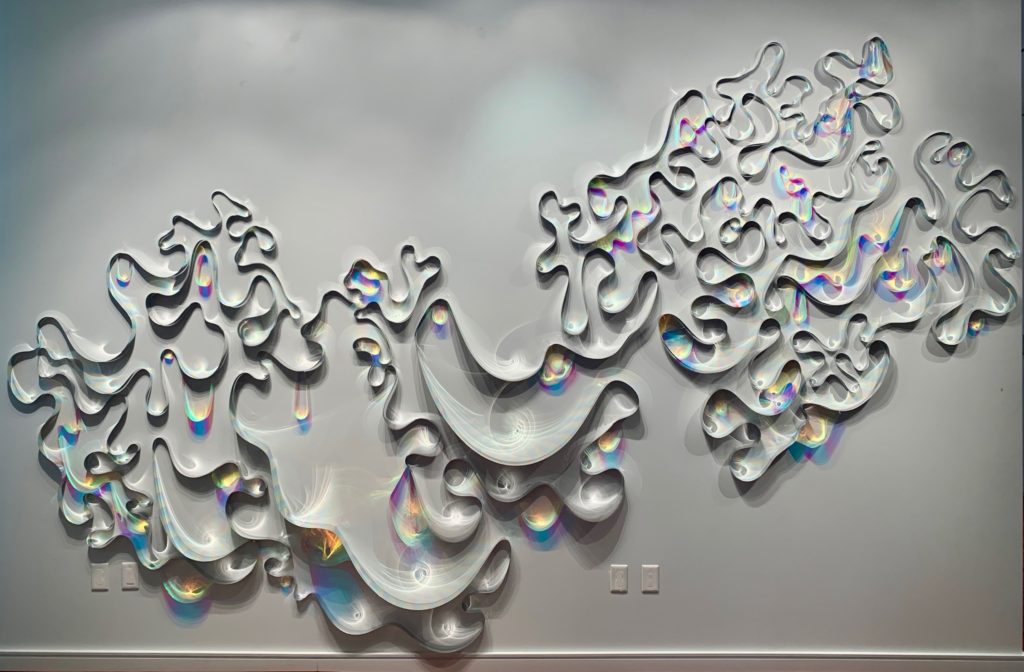
As I studied it in detail, I found myself applying the four pillars of meaning: It was securely attached and belonged to the wall of the gallery. Its purpose was to reflect nature and lead one’s eyes in new directions. It transcended the ordinary and became a work of art. It could be the narration of a story. I hereby choose “Light Wave” to represent the beauty and inspirlation I have found at Chautauqua.
By week’s end, I had some hope for our nation and much appreciation for art and music and friendship. One thing is certain–Chautauqua held the center of my attention for more than one week and provided lasting pleasure. Thank you, Peg and Jack! Thank you, Chautauqua! Hallelujah!
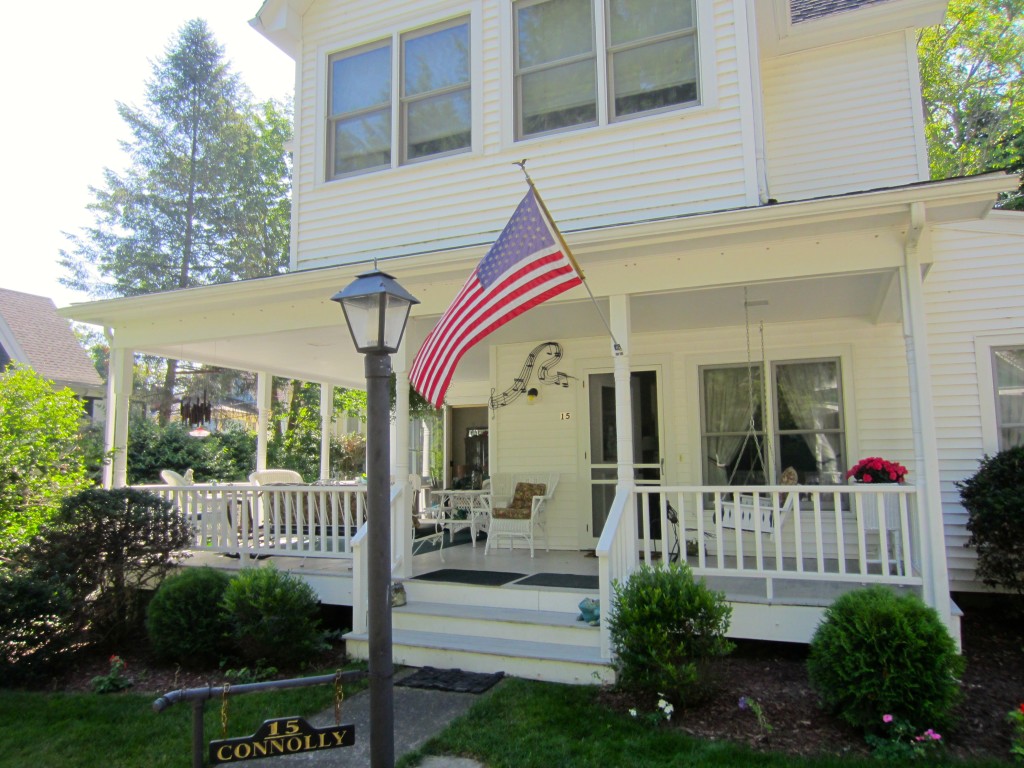
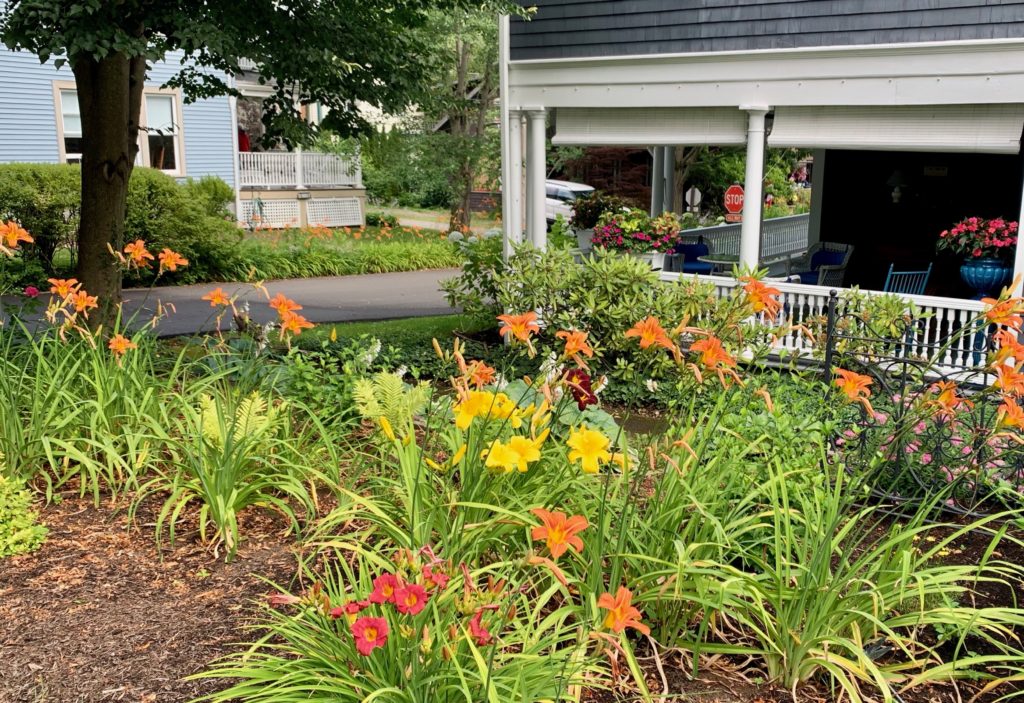
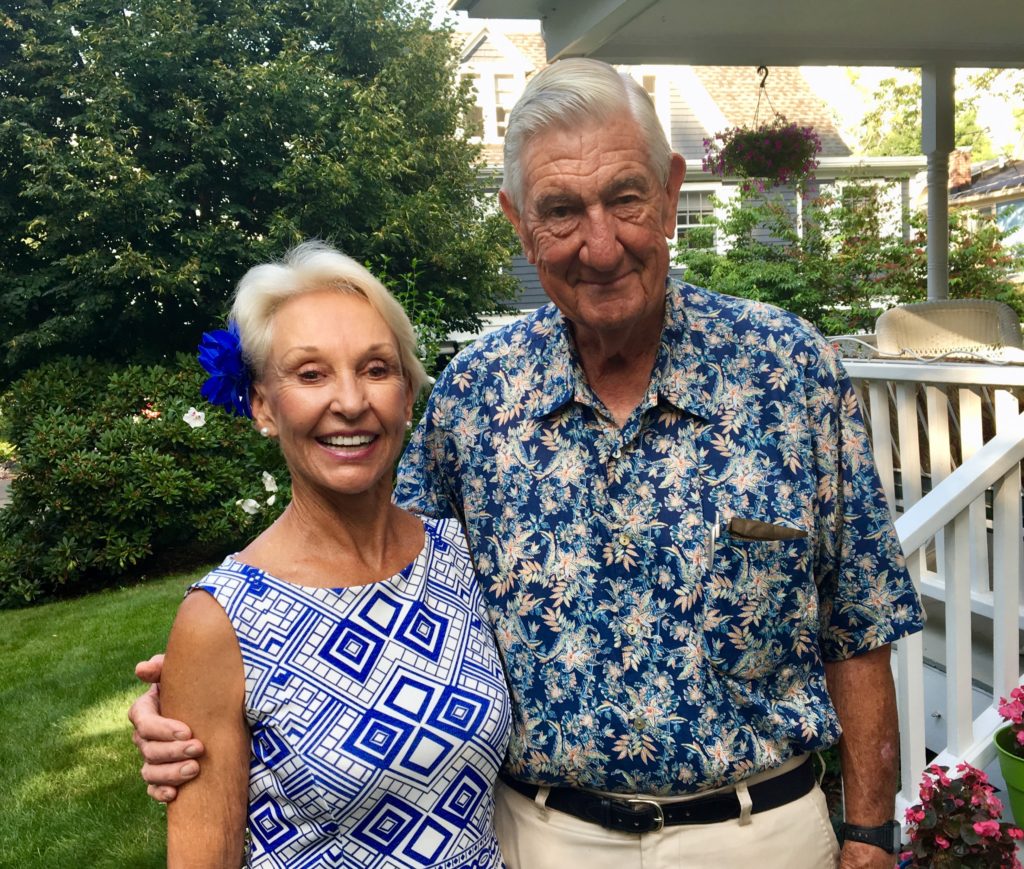
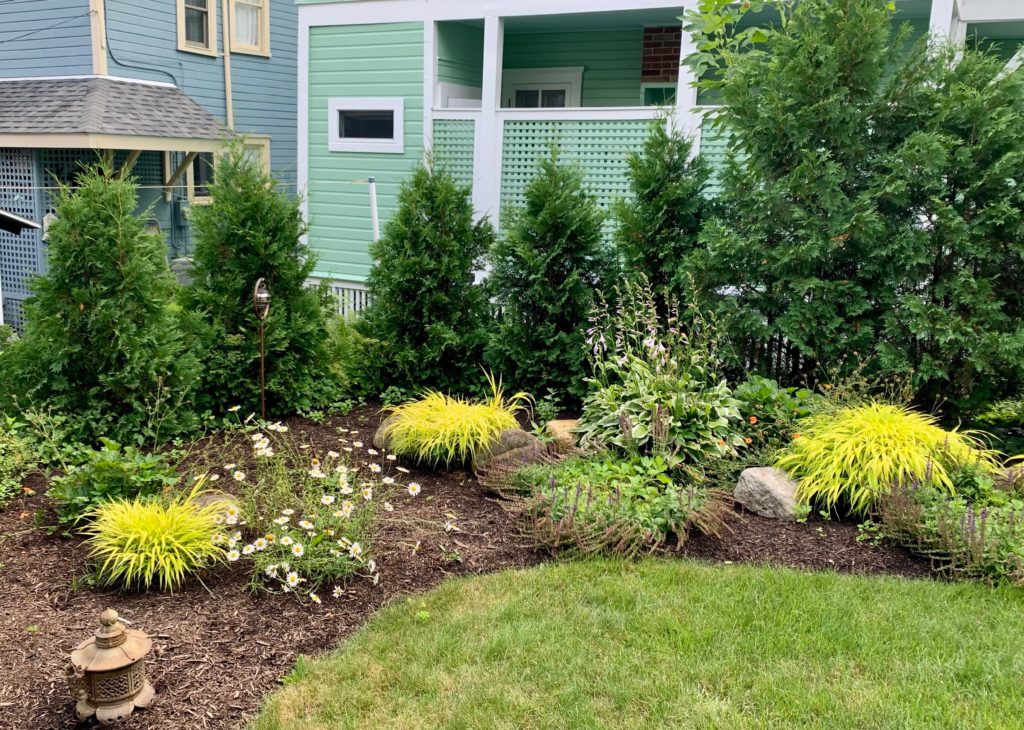
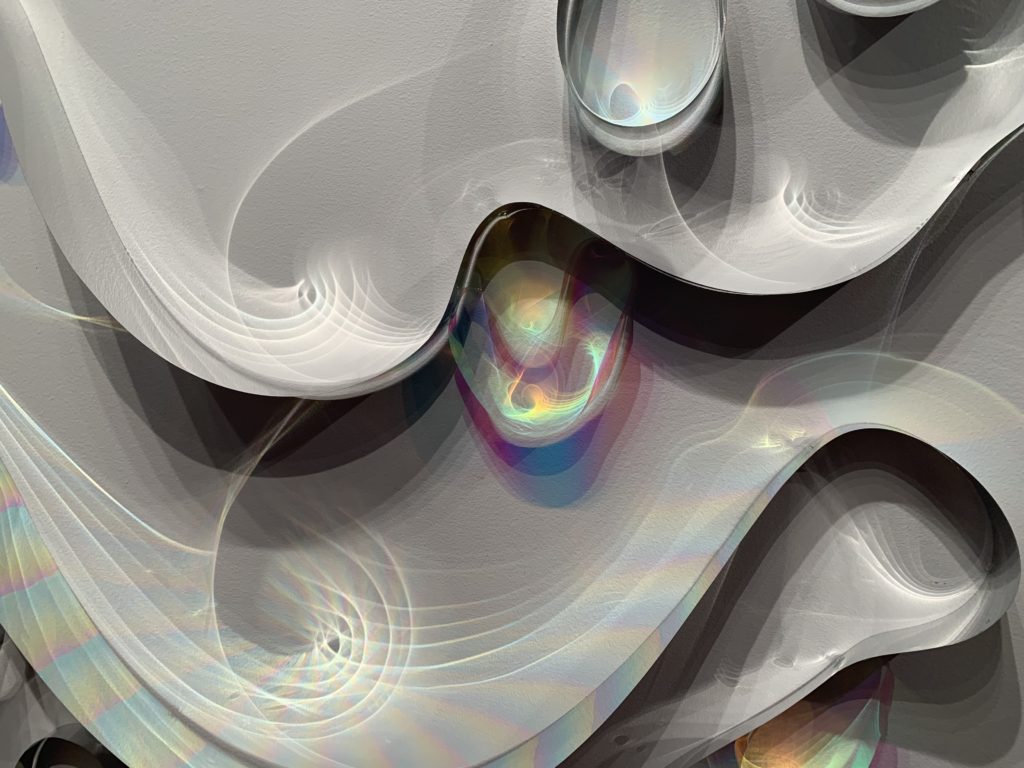
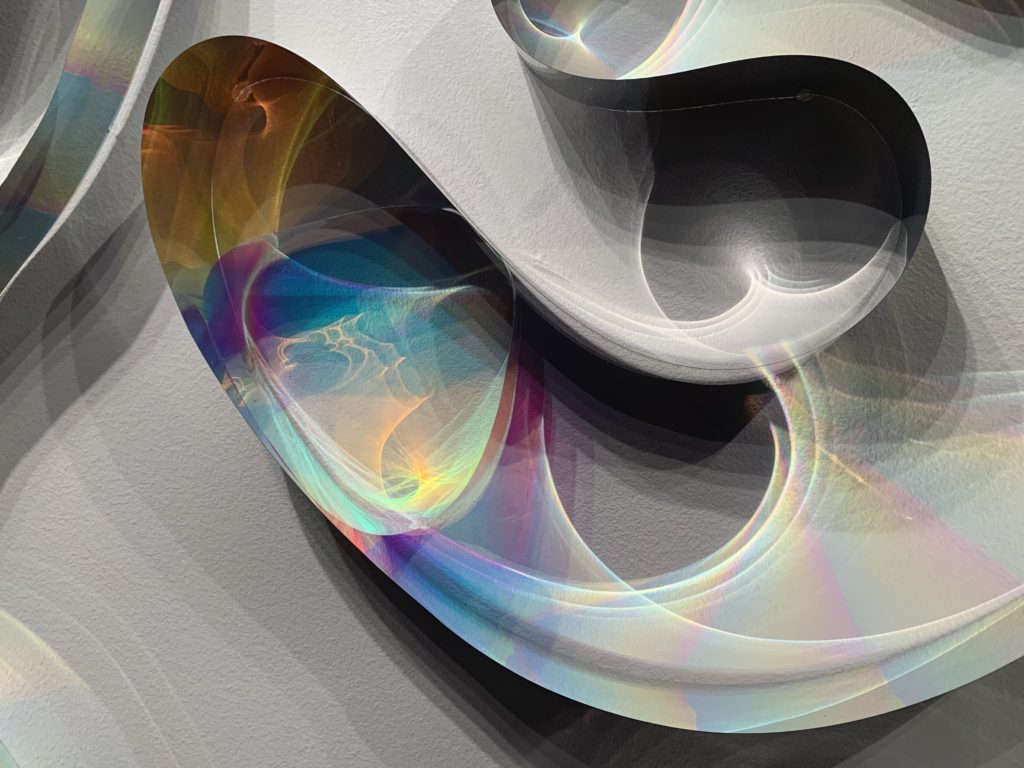
Leave a Reply